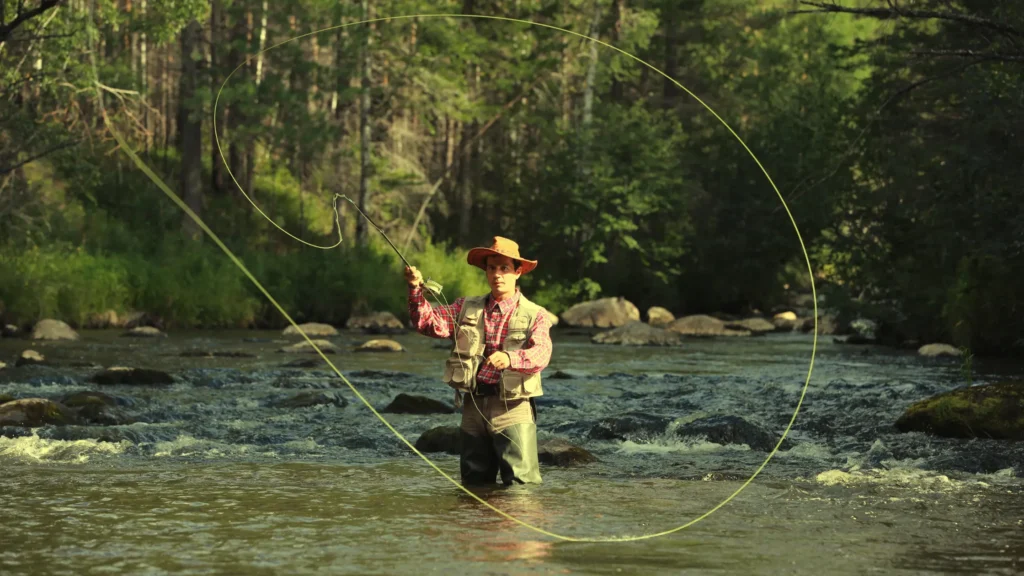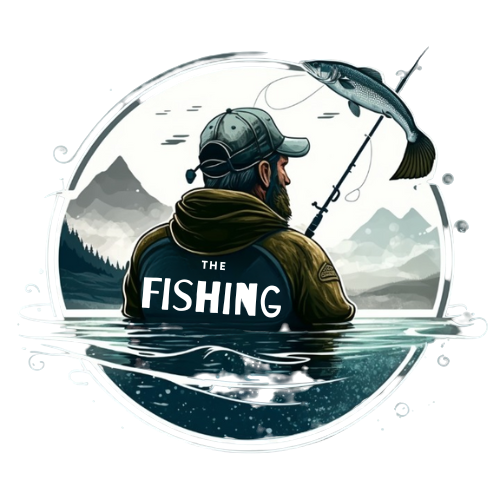Fly fishing is a timeless outdoor activity that has captured the hearts and minds of anglers for centuries. But is fly fishing fun?
In this blog post, I’ll dive into the unique aspects of this angling technique, compare it to other types of fishing, and discuss what makes it an enjoyable and rewarding experience.
Table of Contents
What Makes Fly Fishing Unique?

Many things can make fly fishing unique, such as the use of artificial flies as lures, casting techniques, a closer connection with nature, patience, and finesse.
Fly fishing stands apart from other fishing methods because it uses artificial flies as lures.
These flies are hand-tied creations made from various materials, such as feathers, fur, and thread, designed to imitate insects and other aquatic creatures that fish feed on.
Fly fishing also employs a distinctive casting technique, where the angler uses the weight of the fly line, rather than the weight of the lure, to propel the fly towards the target.
This requires a specialized set of skills, making fly fishing a rewarding challenge for many anglers.
Fly fishing often takes place in beautiful, serene environments, allowing anglers to immerse themselves in nature. This close connection with the outdoors is a big part of the appeal for many fly fishers.
Fly fishing is an art form that requires patience, finesse, and an intimate understanding of fish behavior.
This makes it a deeply engaging and gratifying experience for those who appreciate the subtleties of the sport.
Is Fly Fishing More Fun Than Other Types of Fishing?
Yes, Fly Fishing is More Fun Than Other Types of Fishing.
Fly fishing is often seen as more challenging than other forms of fishing, such as spin fishing. Mastering the skills involved in fly fishing, including casting, presentation, and fly selection, can be incredibly rewarding.
Fly fishing typically involves a more active and engaging experience, as anglers need to constantly adapt their techniques to changing conditions and fish behavior.
This can make it more enjoyable for those who prefer a hands-on approach to fishing.
From pristine mountain streams to lush coastal estuaries, fly fishing can be enjoyed in a wide variety of settings. This allows anglers to explore diverse environments and encounters a range of fish species.
The fly fishing community is known for its welcoming and supportive atmosphere. Anglers often share tips, techniques, and stories, fostering a sense of camaraderie that makes the sport even more enjoyable.
While fly fishing has its own unique appeal, it’s important to note that other fishing methods, like bait casting, can also be enjoyable. Ultimately, personal preferences and experiences will determine which method is the most fun for each angler.
What is the Point of the Fly in Fly Fishing?
First of all, Understand the purpose of the fly as a lure. The fly is the heart of fly fishing. It serves as a lure to entice fish, imitating the appearance and movement of insects and other prey that fish feed on.
To be successful in fly fishing, anglers must understand the behaviors and life cycles of the insects they’re imitating. This knowledge allows them to choose the most effective fly patterns and presentations for a given situation.
Fly tying is both an art and a science, requiring creativity and attention to detail.
Anglers often experiment with different materials, patterns, and techniques to create flies that are both visually appealing and effective at attracting fish.
“Matching the hatch” refers to selecting a fly that closely resembles the insects or other prey that are currently hatching or abundant in the fishing area.
This increases the chances of fooling the fish into biting, making fly selection a crucial aspect of fly fishing success.
What Kind of Fish Can You Catch with Fly Fishing?
Popular fly fishing species (trout, salmon, bass, etc.)
Fly fishing is often associated with targeting trout and salmon, but it can also be effective for catching a variety of other species, such as bass, pike, and even saltwater species like tarpon and bonefish.
Successful fly fishing requires a deep understanding of the target fish’s habitat and feeding habits.
This knowledge helps anglers choose the right flies and techniques to increase their chances of catching their desired species.
One of the joys of fly fishing is its versatility. With the right flies and techniques, anglers can target a wide range of species in different environments, from freshwater streams to saltwater flats.
Catch-and-release is a common practice in fly fishing, promoting conservation and sustainability. Many fly fishers appreciate the opportunity to enjoy the thrill of catching a fish while also minimizing their impact on the environment (Does Fly Fishing Hurt Fish?).
Getting Started with Fly Fishing
To begin fly fishing, you’ll need a fly rod, reel, line, and an assortment of flies. Waders, boots, and other accessories can also be helpful but are not strictly necessary for those just starting out.
To master fly fishing, beginners should focus on learning proper casting techniques and understanding the principles of fly selection. Numerous resources are available to help, from instructional videos to books and classes.
Choosing a suitable fishing location is key to success in fly fishing. Beginners should research local fishing spots, paying attention to factors like fish species, water conditions, and seasonal patterns (What months are best for fly fishing?).
Connecting with other fly fishers can be a great way to learn and improve your skills. Local clubs and online communities offer opportunities to share tips, advice, and camaraderie with fellow anglers (Can you fly fish in the winter in Colorado?).
Conclusion
Fly fishing offers a unique and engaging experience that many anglers find deeply rewarding. From mastering the art of casting and fly selection to connecting with nature and fellow enthusiasts, the joys of fly fishing are numerous.
So, is fly fishing fun? Absolutely! I encourage you to give it a try and discover the excitement for yourself.
FAQs
What is the best age to start to fly fishing?
There’s no “best” age to start fly fishing, as it can be enjoyed by people of all ages. However, younger children may need extra guidance and patience when learning the necessary skills.
How addictive is fly fishing?
Fly fishing can be quite addictive for those who enjoy the challenges and rewards it offers. Many anglers find themselves continually drawn to the sport, constantly seeking new techniques, locations, and species to target.
Does fly fishing actually take skill?
Yes, fly fishing requires a unique set of skills, including casting techniques, fly selection, and an understanding of fish behavior and their environments. Mastering these skills can take time and practice, but the process is often enjoyable and rewarding.
